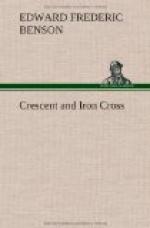the German army, have had their wants supplied.
The governing classes, whom it is necessary to feed,
are not yet suffering, for the Germans grant them enough,
issuing rations to such families as are proved adherents
of the German-Turkish combination, and until the pinch
of want attacks them we should be foolishly optimistic
if we thought that a starving peasantry would cause
the collapse or the defection of Germany’s newest
and most valuable colony. There is enough discontent
to make Germany uneasy, but that is all.[2] Long ago
she proved the efficiency of her control, and the
successful pulling of her puppet-strings, and no instance
of that is more complete than the brief story of Yakub
Jemil and the extinction of him and his party, which,
though it happened a full year ago, has only lately
been completely transmitted. Yakub Jemil was an
influential commander of a frontier guard near the
Black Sea coast. In July 1916 he went to Constantinople,
accompanied by his staff (which included the informant
from whom this account is derived), and, being cordially
received by Enver and Talaat, discussed the situation
with them. He pointed out the demoralising effect
of the Armenian massacres, and the danger of Jemal
the Great’s attitude towards the Arabs in Syria,
realising, and seeking to make them realise, the stupendous
folly of making enemies of the subject peoples, and
urging the re-establishment of cordial relations between
the Turks and them. That, considering that Enver
and Talaat were responsible (under the Germans) for
the Armenian massacres, was a brave outspeaking.
He went on to say that Turkey was at war not on behalf
of herself, but on behalf of Germany, and that it
would be wise of the Government to consider the possibility
of a separate peace with the Powers of the Entente.
He was heard with interest, and took his leave.
He remained in Constantinople, and his views obtained
him many adherents, not only among Turkish officers
whose sympathies were already alienated from Germany,
but among members of the Committee of Union and Progress.
But before long his adherents began to disappear,
and he asked for another interview with Talaat.
He was received, as the informant states, ‘with
open arms,’ for Talaat seized and held him,
called for the guard, and he was searched, and on him
were found certain documents which proved him to hold
the views he had already expressed. That now,
was enough. He was ‘interrogated’
for two days (interrogation is otherwise called torture),
and was then hanged. Subsequently 111 officers
and men in the army also disappeared. Some were
marched into the Khiat Khana Valley, opposite Pera,
and were stabbed: others were sent under escort
to the provinces and murdered. No courts-martial
of any kind were held.
[Footnote 1: Similarly, in October of this year, a new Turkish law was passed, prohibiting the acquisition of Turkish land by foreign settlers. This is aimed point-blank at Germany, and has naturally annoyed Berlin very much.]




